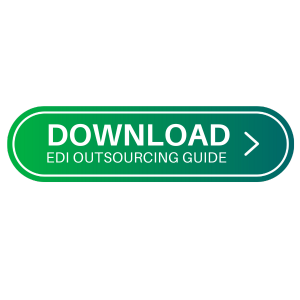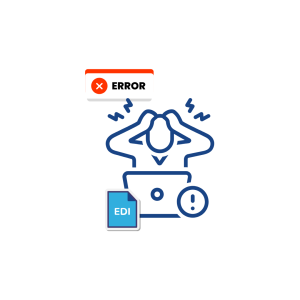Who is an EDI Outsourcing Service Provider?
An EDI outsourcing service provider is a company or organization that offers services related to electronic data interchange to other businesses. These EDI service providers specialize in facilitating the exchange of electronic business documents between trading partners, helping their clients streamline their supply chain and business processes
1. Pricing model
Each company has a different pricing model when it comes to selling its managed EDI services. Some of the pricing models are pay-as-you-go, monthly, and yearly. However, with Commport-managed EDI services, you get to choose any of the 3 pricing models depending on your business needs.
Also, a few other things to check before signing the contract with any other service provider is to check if they have any hidden or additional charges, such as character limits, free VAN services, EDI mapping, or record lengths. If you are dealing with a large amount of data exchange, it might be better to look at all-inclusive packages. Commport offers many types of all-inclusive packages. Please contact our sales team now for more info.
So, to help you choose the best pricing model, it’s better to first assess the volume of your data exchange, which can help you choose the right pricing model that best suits your business scenario.
2. Types of connections and integrations supported
Each trading partner you do business with may have different requirements when it comes to the B2B integration and exchange of EDI documents, and may require different communication protocols. So, it is important to choose the right solution that supports various connections and integrations. Also, it should be compatible enough to add new future connections easily, so that it does not affect your business relationship and growth.
Also, you need to evaluate what type of integration you need between your ERP business systems and EDI. We recommend using a solution that easily integrates with your existing ERP system, as that is easier to manage and track EDI documents.
3. EDI platform security
Does the EDI provider offer a secure platform?
Security is the most important factor to consider before hiring a managed EDI outsourcing provider. Always ask for proof of accreditations and certifications. Cybersecurity is a growing concern and can disrupt business stability and lead to losses. So, it is important to ensure that the EDI outsourcing provider has a secure platform, as you will be exchanging crucial documents with your business partners using EDI.
4. Customer support and Multilingual
Having 24/7 round-the-clock customer support is crucial to ensure business continuity. Especially if you have global operations working in different time zones. Also, this means you will need EDI translation services if there are different formats in use in different regions of organizations. Another thing to also consider when your global operations is to see if the EDI outsourcing provider offers multilingual support, as some of your customers speak a different language than English, and it’s better to consider an EDI outsourcing provider that offers multilingual customer support options.
5. Can you expect platform downtime?
In any IT environment, downtime is common. Sometimes it could be planned downtime, and sometimes it could be due to some technical glitches. However, the most important thing to consider is how your EDI provider manages this downtime in terms of customer communication and backup. It is important to note that any downtime can limit the exchange of documents and can cause losses to the business.
So, it is important to note that your provider has strong communication and backup processes in place in such a situation, which could affect your business continuity. Als,o do clarify what kind of support you can expect from their customer support team during downtime.
6. Is the solution user-friendly
The two main reasons for many businesses to switch to managed EDI services are that they don’t have time to invest in infrastructure, and the other to automate the business process and avoid manual human interventions to avoid processing delays and errors. Considering these reasons, your business must choose the right EDI vendor that offers a user-friendly solution that can be operated by individuals with minimal to no prior EDI knowledge.
It should be easy for you to add business partners and use the solution. Also, one other thing to consider is to check if the EDI vendor provides onboarding tutorial videos, as it makes onboarding a breeze.
7. Experience in the Industry
The experience of an EDI vendor in a particular set of industries is also very important, as they already understand the EDI format and can also have existing connections with your trading partner in your industry. Also, the EDI standard format varies from one industry to another. The more industries the EDI vendor has experience in, is better.
8. Can the EDI solution scale as you grow?
As your business grows, the solution should be able to handle the changes. A good EDI solution should be able to let you extend or increase the number of EDI business relations, such as customers, vendors, or warehouses with ease. Also, you should check that the EDI provider offers an expedited onboarding process for all your vendors, and customers can help you get started with EDI quickly. That’s why you should try to find a provider who has experience in your industry and has established relationships with your trading partners already, which will make the onboarding process faster.
9. Can you add other services easily?
Going to multiple vendors for different EDI needs can be time-consuming and frustrating. It’s important to identify a vendor who offers a complete range of EDI solutions and services under one roof. As your business scales, you may require different services, and Companies like Commport Communications not only provide managed EDI services, but can also provide EDI translation, mapping, and various other solutions under one roof. This can make your job easier, and as a business owner, you don’t have to look for different vendors for different services.
10. Implementation time and cost
As we all know, time is money. The more time it takes to find a suitable solution, the more money you lose as a business. So, it is important to ask your new vendor before onboarding their services how long it will take them to complete the implementation and get running. You need to ask what the time taken for similar projects in the past was and if they can provide you with tentative deadlines to complete the project on time. The most important step is to check for references to past implementations. Once you learn about other companies and their experiences and challenges, it might be easier to decide.
11. Feature compatibility
Before deciding on an EDI vendor, it’s also important to check if the services provided by the vendor are compatible with your business technology, like does it can be easily integrated with your ERP, accounting, billing, order processing, and other systems at your end. The more compatible the solution is, the better it will integrate with all your internal business systems and can help automate the whole process and improve business efficiency and cash flow.
12. Data transaction volume
As your business scales, the total data transactions will also increase. So, it is important to note how much volume of data your vendor system can handle at any given time, and it is easy to scale this volume as your business grows. Also, another important thing to consider here is the pricing, with increased data transaction volume, there is a chance of an increase in pricing as well, so it’s better to understand your vendor pricing model and how it’s going to cost you as a business owner before signing up with any EDI vendor. The tip here is to choose a vendor that offers flexible payment options.
Conclusion
By partnering with an EDI outsourcing service provider, businesses can benefit from their expertise and technology infrastructure, allowing them to focus on their core operations while ensuring efficient and compliant EDI communications with their trading partners. Choosing the right provider depends on a company’s specific EDI needs, industry requirements, and the scale of their operations.

Get Started With Commport EDI Outsourcing Services
Need Help? Download: EDI Buyers Guide
Unlock the full potential of your supply chain with our comprehensive EDI Buyer's Guide — your first step towards seamless, efficient, and error-free transactions
Frequently Asked Questions
An EDI outsourcing service provider is a third-party company that specializes in managing Electronic Data Interchange (EDI) processes on behalf of businesses. These providers handle tasks such as data mapping, document translation, and communication with trading partners.
Businesses choose to outsource EDI processes to benefit from the expertise and efficiency of specialized service providers. Outsourcing reduces the burden on in-house teams, improves accuracy, and ensures compliance with EDI standards.
Yes, businesses of all sizes can benefit from EDI outsourcing. Service providers often offer scalable solutions, making it feasible for small, medium, and large enterprises to leverage the advantages of outsourced EDI services.
EDI outsourcing providers offer a range of services, including data mapping, document translation, trading partner onboarding, monitoring and support, and compliance management. These services are tailored to meet the specific needs of businesses.
EDI outsourcing enhances business efficiency by allowing organizations to focus on their core functions while experts manage the complexities of EDI processes. This results in faster document exchange, reduced errors, and improved overall supply chain efficiency.





